Consolidate Bills
One of the more appealing options for dealing with multiple debts is to consolidate them into one loan. That way, you can focus on that one payment each month instead of having to keep up with several payments that are due at different times of the month.
For homeowners that have good credit and lots of equity, this is a fairly reasonable option. They may even see additional tax savings through interest deductions.
For everyone else, it may be very difficult to get approved for a large loan to pay off other debts. Unsecured loans are rarely for more than a few thousand dollars unless you have excellent credit.
When you are already having trouble paying your bills, you can expect that your credit scores are in the cellar. This may make a consolidation loan nearly impossible.
For this purpose, credit card companies do generally participate in debt management programs offered by financial counseling organizations. These special programs consolidate your payments into a structured repayment plan so that you can commit to eliminating your unsecured debt in less than 5 years.
When you are having trouble with your car payments, it is easy to overlook the fact that you are paying 18-25% or more on credit cards. It is quite common for someone that enrolls in a debt management program to see their monthly payments drop about 20%. Some debtors save less than that and some more depending on their situations.
If you think you might be a candidate to consolidate your bills, you should gather details on all of your debt accounts so that your financial counselor can review them with you. From there, they can identify possible options for you to pursue.
Debt consolidation only works when the new terms are better than the old terms. The advantage is that you have the opportunity to find out what the recommendations are before you enroll into any plan.
For more information on consolidating your unsecured payments, visit the online counseling tools available through Debtors Unite. Whatever action you decide on, it is important that you act before your lender does. Once your lender has marked your account as a defaulted debt, the real nightmare can begin.




.jpg)
